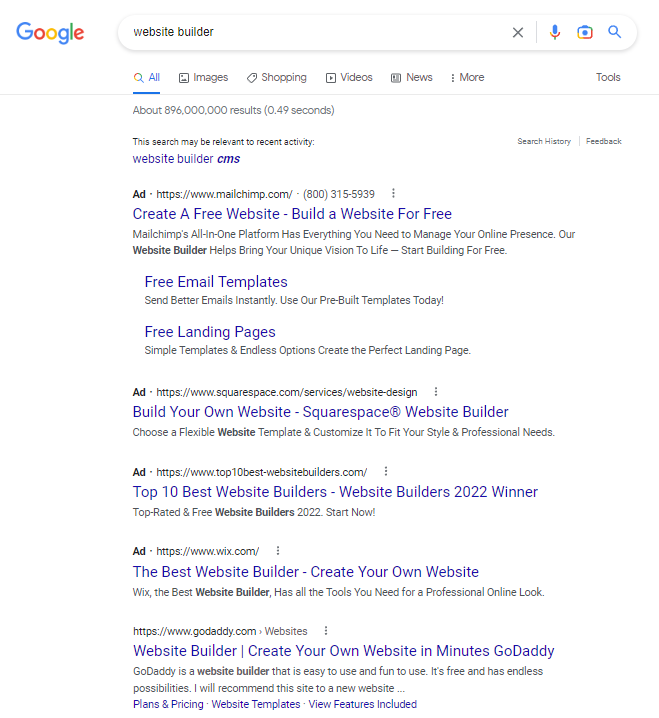Organic search engine optimization (SEO) is the process of showing up higher on the search engine results pages (SERPs) naturally.
Organic search is one of the most effective channels to gain traffic or conversions because it’s free – relative to paid search, where you have to pay for your placement and clicks – and users understand that you are relevant for what they typed in.
A very lame joke in the SEO industry goes, “The best place to hide a dead body is on page two of Google because no one is going to look there.”
See?
Pretty lame, but the point is that if you are not on the first page of SERPs, no one is going to see your pages.
Think about the last time you went to page two of Google to do anything like read an article or buy a product. It doesn’t matter what you were trying to do; there’s almost no way you went to page two to do it.
We can utilize many strategies for organic search, such as keyword research and optimizing content or fixing technical issues that hinder a user from accessing the website.
In this article, we will focus on the different ways you can increase your organic visibility, how SEO works, why this channel is important for your business, and how to get started with organic search.
How Does Organic Search Work?
The simplest way to refer to organic search is to think about what is the most relevant search result for a user to see when they type in a specific keyword or query into Google.
Organic search is a process made up of various digital marketing strategies to ensure our result shows up first or, at the very least, on the first page of search engine results.
Showing up on the top of Google is not some magic trick. It takes coordination and cooperation from many different departments, executive buy-in, a talented team of marketers and SEO pros, and a viable way to track and monitor your results.
Organic search consists of a variety of different techniques, such as keyword research, content optimization and creation, technical auditing, and offline marketing strategies.
The goal of organic search is to make sure the user has a great experience on your website and landing pages, and gets the answer they are looking for – whether that is to consume content, compare two things to each other, or purchase a product.
Google doesn’t really care about organic search. What Google does care about is making sure its users find unique, useful, and relevant content for what they are looking for.
If you can match your content to the heart and mind of the user, then you can make sure that Google rewards your efforts and shows your page higher up on the SERPs.
There are a lot of different ways you can create a great user experience on your website.
Organic search is broken down into three main categories: relevancy, discoverability, and authority.
- Relevancy is the relevance of a page’s theme and content related to specific target keywords.
- Discoverability is the ability for a site to be properly found and indexed by search engines.
- Authority is the page’s authority within search engines.
These factors can contribute to pages being ranked higher on the SERPs, ideally on page one.
Those who work in SEO need to collaborate with a variety of different departments to make sure you can continue to provide the best user experience to your customers.
SEO professionals need to work with the content team to create high-quality content. They also need to work with the development team to make sure their website is technically sound, and, finally, they need to monitor all of these results to ensure that what they are doing is working.
When working with the development team, you must ensure that the content you create loads quickly and is easily found by search engines and users alike.
One of the best ways to make sure this content is found is by linking to your relevant content internally. This makes it easy for Google and users to find your content and understand its related content.
Page and site speed is also important to keep in mind, as Google values this as it relates to user experience.
Think about how many times you’ve left a site because it loads slowly – that’s why it’s important to consider this when creating content.
As you can see, many different factors and teams are involved in ensuring your website is in good shape, which all lead to successful SEO efforts.
One of the best ways to get more buy-in around SEO is showing fellow team members and departments the impact it can have on your business, brand awareness, and online visibility.
Why Organic Search Is Important For Your Business
Organic search is important for your business because your consumer spends a significant amount of time searching for answers to questions or problems on Google.
Nowadays, there are over 2 trillion searches on Google every single year.
In addition, most of your website traffic is from organic search –whether you realize it or not.
With the growth of mobile, every day, Google sees around 15-20% of queries that it has never seen before.
Think about how often you are typing something into Google on your smartphone, whether it’s to search for an actor’s latest movie, find a new product, look up a location, or type in something personal that you don’t want to ask anyone else.
The point is that Google is where your customers go to begin their buyer’s journey, so it’s important to ensure you are investing in organic search so you can rank on page one for relevant search terms.
The old way to think about SEO was to create content and then tell the search team to “go SEO this” article and hope high rankings follow.
Instead, you need to invest in search intelligence at the beginning of the content creation process. This way, you can inform the content team what they should include in their content or what type of content they should create.
If you continue to think of the SEO team as the janitors of the organization, then your organic traffic will never truly increase.
You need to be more proactive with your search data and use that information to power what you do internally and create an efficient SEO strategy and program.
Whether we like it or not, people are using search engines for every single thing in their day-to-day lives, so we need to start investing more time into SEO in the same way that companies dedicate so much time to paid search.
The Difference Between Paid & Organic Search
The main difference between paid and organic search is that paid search is a pay-to-play traffic source, while organic search is earned by providing the best results for a given search.
Typically, paid search is denoted at the top or bottom of the SERP with an “Ad” label. Everything found below these paid ads is the organic search results.
 Screenshot from Google search for website builder, October 2022
Screenshot from Google search for website builder, October 2022Paid search is a short-term strategy for showing up on search engines because the second you stop paying for ads, you stop showing up.
Organic search is a long-term strategy for showing up on search engines because you can consistently rank on page one for years by only implementing slight tweaks to the ranking page.
It’s a much more cost-effective way to get traffic and conversions because you are not paying every time someone clicks on your ranking content.
Organic search results can be displayed in many ways: standard blue links, answer box results, People Also Ask, local packs, images, videos, etc.
We need to prioritize organic search because organic search results’ click-through rate (CTR) is nearly ten times higher than paid search.
Think about how often you skip the ads on YouTube or fast forward during commercials. Simply by looking at user behavior, we know that paid ads are not the most appropriate place to go anymore to get information.
Users prefer to navigate and click on the organic listings because they know this content will have the answer they want.
I’m not saying to avoid paid search completely, but there should be a healthy balance and synergy between your paid and organic efforts rather than focusing all of your resources on the short-term gains provided by paid search.
You can create a very effective digital marketing strategy by ensuring synergy between the channels.
For example, if there are keywords you are not ranking for on page one, you should start increasing your paid spend on these keywords while you work on optimizing the related content.
Additionally, suppose there are keywords you are already ranking for on page one. In that case, you can decrease your paid spend on these phrases – because you don’t need to pay for clicks if you are already ranking organically at the top of the results.
Some case studies (Disclosure: I work at Conductor) say showing up in paid and organic listings is better, since users remember the brand name.
Overall, by using the data between the two channels, you can figure out and test what is best for your organization.
How To Get Started With Organic Search?
There are a lot of different levers you can pull in SEO to start getting things done.
The way you should be thinking about getting started with SEO is by making sure your website content is relevant and discoverable.
Breaking this down at a high level, you need to be creating relevant content and making sure this content is accessible and technically sound.
The Voice Of The Customer
First, you should create content that matches the voice of the consumer. Keyword research is the bread and butter of creating content. It’s the very first step to take when considering creating a landing page.
If you aren’t matching your content to the customer’s voice, then no one will find it. By doing keyword research, you can ensure that your high-quality content uses phrases that customers actually search for.
Monthly search volume (MSV), or the average amount of people searching for a phrase every month, is an important metric, but it’s also a directional metric.
You need to prioritize the relevancy of your keyword first and foremost. Otherwise, since the SERP is so competitive, you might be bringing in unqualified traffic or will never have the chance to rank.
A Sound Technical Foundation
Second, when creating your content or website, you want to make sure that the technical foundation is sound.
From a high level, Google or any other search engine crawler finds your content by crawling all the links on your website and following all the links that are accessible.
Next, search engines start to analyze these links to see what the content is on the page and store this in the search index.
Finally, when a user searches for something on the search engine, it serves this content to the user and ranks the most relevant landing pages by what the algorithm feels will provide the best answer.
This is important because if you make it hard for Google to find your content, or if you are creating content that loads really slowly, then Google will not want to surface this content to users.
Monitor And Measure Results
Finally, you need to monitor and measure the results of the strategies you implement.
Using enterprise SEO software or a smaller SEO tool, you can keep track of our keyword rankings, market share, and organic traffic to better understand what is happening and when changes are needed.
Half of the story is about doing research and implementing the changes. The other half is digging into reporting to see what works and doesn’t.
Conclusion
Organic search is the best way to make sure that users find your content. You aren’t paying for these clicks; you’re earning them.
Users understand that the content showing up at the top of search engine results is the most relevant and helpful content for what they are searching for.
By making life easier for Google, you also end up reaping the rewards, as your content and website receive more organic traffic, conversions, and recognition internally.
Becoming more visible organically is not an easy undertaking.
There will always be a lot of trial and error before figuring out what works. That’s the best part of SEO, though – once you figure out what works, you can replicate those wins and learnings across the entire site.
SEO is a very fast-paced industry that is always changing.
By staying up to date on algorithm updates, new result types, and industry trends, you can make sure your site is always at the top of search results.
Hopefully, this article has provided you with a basic understanding of what organic search is, how to take action, and why it’s important for your business. To learn more about SEO and advanced topics, check out SEJ’s SEO for Beginners Guide.
More resources:
- 10 Different Ways To Get Organic Page 1 Google Rankings
- 5 Key On-Page Optimizations For Local Organic SEO
- SEO for Beginners: An Introduction to SEO Basics
Featured Image: smunu/Shutterstock






![[SEO, PPC & Attribution] Unlocking The Power Of Offline Marketing In A Digital World](https://www.searchenginejournal.com/wp-content/uploads/2025/03/sidebar1x-534.png)